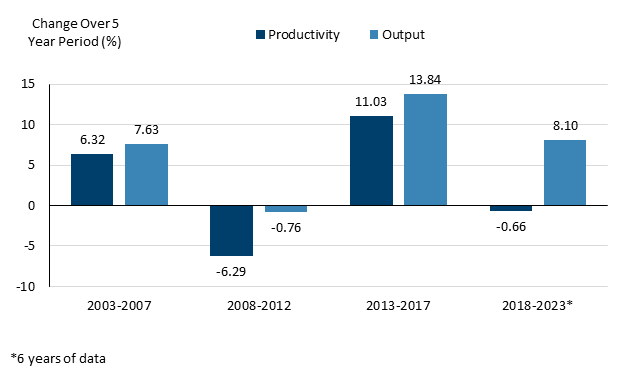Canadian food manufacturing holds food security opportunity: FCC report
Wednesday, August 28, 2024
Reference: Press Release
 Regina, Saskatchewan, August 28, 2024 – Canadian food manufacturing plays a crucial role in addressing the need to sustainably feed a growing global population according to a recent FCC Economics report.
Regina, Saskatchewan, August 28, 2024 – Canadian food manufacturing plays a crucial role in addressing the need to sustainably feed a growing global population according to a recent FCC Economics report. Food is the largest manufacturing sector in Canada by both employment and sales. With abundant natural resources and a strong global reputation for safe and high-quality food, the sector is poised to be a world leader in sustainable food production.
“If we’re going to tackle some of the most pressing challenges facing our planet like hunger, global health, climate change and stagnant economic growth, we need to build new and ambitious partnerships with key sectors like food manufacturing,” said Krishen Rangasamy, FCC manager economic insights. “To fully capitalize on this opportunity, we also need to engage investment and innovation by those in our industry and beyond.”
With the world’s population expected to exceed 9 billion by 2050, the Food and Agriculture Organization (FAO) estimates that agricultural production needs to increase by 60 per cent over 2005 levels. This challenge requires producing more food with the same or fewer inputs- a task that Canadian food manufacturing is well-positioned to tackle as it makes the most of the potential created through smart manufacturing and digitization.
“Just as steam, electricity, and the internet propelled us to produce more with fewer inputs during previous industrial revolutions, automation, robotics, artificial intelligence, and blockchain are shaping up to do the same in food manufacturing in the fourth industrial revolution,” said Amanda Norris, FCC senior economist. “These technologies can improve output and labour efficiency, manage inventory, prevent unplanned downtime, forecast demand, track production, and ensure quality control - all opportunities to help improve productivity in Canadian food manufacturing.”
Productivity increases when output grows faster than working hours, a trend that has been evident in Canadian food manufacturing over the past two decades. Despite challenges between 2008 and 2012, the industry has rebounded, demonstrating resilience and the ability to produce more food in less time.
“Food manufacturing in Canada has already proven its resilience and adaptability. After a period of decline, the industry rebounded by investing in new technologies and consolidating operations, leading to an 11 per cent productivity growth between 2013 and 2017,” Norris explains. “Now, with productivity growth remaining relatively flat, it’s time for a renewed focus on innovation to drive the next wave of growth.”
Figure 1: Food manufacturing productivity rebounded after a slump between 2008 and 2012, but remains flat in recent years

Rangasamy also underscores the importance of attracting investment from sectors outside of agriculture and food. “To truly harness the potential of the fourth industrial revolution, we need greater investment from those who may not traditionally see themselves as part of the ag and food industry,” he notes. “This will help us scale up and innovate, ensuring that Canada not only meets the food demands of tomorrow but does so in a way that benefits all Canadians.”
By embracing new technologies and fostering cross-sector investment, the industry can continue to lead in sustainable food production, ensuring a stable food supply and contributing to the global effort to feed the world.
“Productivity growth is not a one-size-fits-all solution; it requires a blend of efficiency, economies of scale, and innovation,” Norris stated. “By embracing new technologies and supporting a qualified labour force, Canada’s food manufacturing sector can help sustainably feed the global population and maintain a competitive edge in the international market.”
About FCC
FCC is proud to be 100 per cent invested in Canadian agriculture and food. The organization’s employees are committed to the long-standing success of those who produce and process Canadian food. FCC provides flexible financing and capital solutions, while creating value through data, knowledge, relationships and expertise. FCC offers a complement of financial and non-financial products and services designed to support the complex and evolving needs of the industry. As a commercial Crown corporation, FCC is a stable partner that reinvests profits back into the industry and communities it serves. For more information, visit fcc.ca.
For more information, photos or interviews, please contact:
Éva Larouche (bilingual)
Corporate Communication
Farm Credit Canada
1-888-780-6647
eva.larouche@fcc.ca
Sign up to stay connected
- News
- Property Alerts
- Save your favourite properties
- And more!
Joining Farm Marketer is free, easy and you can opt out at any time.
